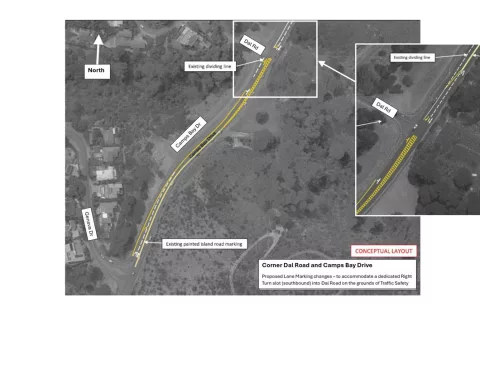The city of Cape Town has given the green light for the formation of two new City Improvement Districts (CIDs) – Eastlake Island and Newlands – which will enhance urban services for residents and complement municipal services. CIDs are formed by communities themselves and are funded through extra property rates. The newly established CIDs have the potential to act as a benchmark for other communities and inspire a domino effect of urban development across Cape Town.
What are City Improvement Districts (CIDs)?
City Improvement Districts (CIDs) are entities formed by communities to complement municipal services and enrich the urban landscape. They are funded through extra property rates charged on municipal evaluations of property owners within the CID boundaries and are pivotal in championing and safeguarding the rights of residents in their respective districts. The cities of Eastlake Island and Newlands have recently been sanctioned to form their own CIDs, and their success is expected to inspire other communities to follow suit in Cape Town.
Cape Town City Council Sanctions Creation of Two New CIDs
The municipal administration of Cape Town has greenlighted the formation of two new City Improvement Districts (CIDs), namely Eastlake Island and Newlands. This significant decision aligns with section 5(1) of the CID By-law. The council backed these initiatives on 31st May 2024, following the application submission by these regions which detailed the demand for CIDs and their strategic plan to enhance urban services for their inhabitants.
Eastlake Island City Improvement District and Newlands Community Improvement District, each holding unique visions and missions, are the latest to be included in the ever-growing communities embarking on self-developmental journeys. The council’s affirmation of these developments speaks volumes about the city’s commitment to empowering communities to steer their own progress. Moreover, it shows the city’s support for CIDs boasting strong business models and concise goals.
Role and Significance of City Improvement Districts
Alderman Eddie Andrews, the Deputy Mayor and Mayoral Committee Member for Spatial Planning and Environment, emphasized the significance of CIDs in his statement. He remarked, “These entities are pivotal in championing and safeguarding the rights of residents in their respective districts.”
The value of CIDs is embedded in their inception by the communities themselves, thereby enriching and complementing municipal services. Both the Eastlake Island CID and Newlands CID are anticipated to start their services on 1st July 2024 and will continue until 30th June 2029.
Each locale submitted substantial evidence to corroborate the need for their individual CID requirements, meeting the stipulations of conducting public meetings, submitting business plans, and attaining more than the requisite 60% approval from property owners.
Community Participation and CID Financing
Emphasizing the role of community participation, Alderman Andrews pointed out that CIDs are formed only when requested by communities. He elaborated, “A minimum of 60% of property owners must back the CID proposal for a residential CID, and a majority of 50% plus one must support a non-residential CID. CIDs are not something that the City imposes on any community.”
The funding for CIDs is sourced through extra property rates charged on municipal evaluations of property owners within the CID boundaries. The City gathers these additional rates and transfers them to the CIDs monthly. This revenue is then deployed by the CIDs to provide the extra services outlined in their respective business plans.
The Potential of City Improvement Districts
In the sphere of urban progression, these newly established CIDs have the ability to act as a benchmark for other communities. The city is prepared to offer information to other communities interested in setting up their own CIDs, further demonstrating its pledge to cultivate self-reliant, thriving, and empowered communities.
With their newly sanctioned CIDs, the cities of Eastlake Island and Newlands are on the verge of a transformative journey, a journey filled with the promise of an enriched urban landscape and upgraded municipal services. It’s hoped that their success will act as an inspiration for other communities to follow in their footsteps, thereby creating a domino effect of urban development across Cape Town.
1. What are City Improvement Districts (CIDs)?
City Improvement Districts (CIDs) are entities formed by communities to complement municipal services and enrich the urban landscape. They are funded through extra property rates charged on municipal evaluations of property owners within the CID boundaries and are pivotal in championing and safeguarding the rights of residents in their respective districts.
2. What is the significance of the newly sanctioned CIDs in Cape Town?
The newly established CIDs in Eastlake Island and Newlands have the potential to act as a benchmark for other communities and inspire a domino effect of urban development across Cape Town. They will enhance urban services for residents and complement municipal services.
3. How are CIDs funded?
CIDs are funded through extra property rates charged on municipal evaluations of property owners within the CID boundaries. The City gathers these additional rates and transfers them to the CIDs monthly.
4. What is the role of community participation in the formation of CIDs?
CIDs are formed only when requested by communities. A minimum of 60% of property owners must back the CID proposal for a residential CID, and a majority of 50% plus one must support a non-residential CID. CIDs are not something that the City imposes on any community.
5. What is the significance of CIDs in urban development?
CIDs are pivotal in championing and safeguarding the rights of residents in their respective districts. They complement municipal services and enrich the urban landscape. The success of the newly established CIDs in Eastlake Island and Newlands is expected to inspire other communities to follow suit in Cape Town.
6. How long will the newly established CIDs in Eastlake Island and Newlands continue their services?
Both the Eastlake Island CID and Newlands CID are anticipated to start their services on 1st July 2024 and will continue until 30th June 2029.












